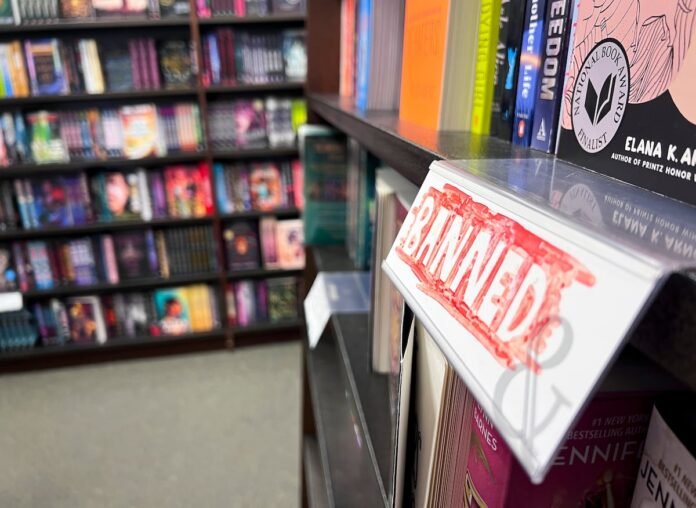The Foundation for Individual Rights and Expression sent a letter to Utah school officials, saying the state is violating students’ First Amendment rights.
(Bethany Baker | The Salt Lake Tribune) A sign indicates a book for sale at Barnes and Noble that has been banned in Utah public schools in Salt Lake City Saturday, Dec. 14, 2024.
A free-speech advocacy group is demanding the Utah State Board of Education change its guidance that says students can’t bring personal copies of banned books to school — arguing the guidance violates the students’ First Amendment rights.
The group — The Foundation for Individual Rights and Expression, or FIRE — sent a letter Monday to Davina Sauthoff, the USBE’s library media specialist. FIRE asserts that while “obscene” materials and speech are not protected under the First Amendment, Utah’s definition of “sensitive materials” doesn’t meet the legal standard for obscenity — so students still have the right to bring those books to school.
“[Schools] are not just removing books from classroom instruction — they are entirely banning students’ personal possession of non-obscene books on all school property,” the letter states.
USBE did not immediately respond Tuesday to requests for comment.
Eighteen books are currently banned from Utah’s public schools in accordance with a law passed last year. The titles include books written by acclaimed authors like Margaret Atwood, Judy Blume and Ellen Hopkins. The most recent book added to the list, in May, was Sara Gruen’s “Water for Elephants.”
Under Utah law, a book must be removed from all public schools in the state if at least three school districts (or at least two school districts and five charter schools) determine it amounts to “objective sensitive material” — pornographic or otherwise indecent content, as defined by Utah code.
Materials can be considered “objective sensitive material” in Utah if they: 1) contain a description or depiction of “human genitals in a state of sexual stimulation or arousal”; 2) contain a description or depiction of “acts of human masturbation, sexual intercourse, or sodomy”; and/or 3) contain a description or depiction of “fondling or other erotic touching of human genitals or [the] pubic region.”
In its letter, FIRE argues that while many of Utah’s banned books contain sexual content, they do not, when considered as a whole, meet the legal definition of obscenity.
That definition has been shaped by decades of court rulings, most notably the U.S. Supreme Court’s 1973 decision in Miller v. California, Stephanie Jablonsky, senior program counsel for FIRE, said in an interview.
In that case, the court established a three-part test — known as the Miller test — to determine whether a work is legally obscene and therefore not protected by the First Amendment.
Under the Miller Test, a material is considered obscene if:
All three criteria must be met for a work to be legally considered obscene.
The U.S. Court of Appeals for the Tenth Circuit, which governs Utah, also upheld an adaptation of the Miller obscenity test tailored for minors, FIRE’s letter argues.
The minor-specific version upheld by the Tenth Circuit considers:
“They can certainly ban obscene books, and we’re not refuting that,” Jablonsky said. “The problem is that the law defining indecent materials is not the same legal test for obscenity. So, while a Margaret Atwood book might have a chapter that has some kind of sexual content, … it certainly wouldn’t qualify as legally obscene.”
FIRE’s letter concludes by demanding USBE revise its guidance.
“School districts and the state of Utah have authority to exclude books from the curriculum or instructional use, and to prevent substantial disruption of school operations,” the letter states. “But Utah schools must not infringe students’ First Amendment right to receive ideas, which entails the ability to possess and read books at school on personal time.”
FIRE requested a “substantive” response from USBE no later than June 30. Jablonsky said if USBE does not revise its guidance, the group could take legal action.






